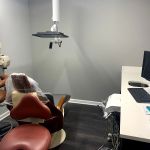1. Understanding Safe Dental Procedures
Safe dental procedures are an essential aspect of maintaining overall oral health. These procedures ensure that patients experience minimal discomfort, reduced risks of infection, and effective long-term outcomes. Understanding what makes a dental procedure safe is key to ensuring that your treatment is both effective and risk-free.Dental professionals are trained to use the latest technology and best practices to ensure that every procedure, from routine cleanings to more advanced treatments, is conducted with the highest level of safety. Whether you're undergoing a simple filling or a more complex root canal, ensuring the safety of the procedure is a priority for any reputable dental practice.2. Key Factors in Ensuring Safe Dental Procedures
Several factors contribute to the safety of dental procedures. Let's explore the most crucial ones:- Proper Training and Certification: Dentists must be well-trained and certified to perform any procedure. This guarantees they are familiar with the necessary techniques and safety protocols.
- Use of Sterile Equipment: Ensuring that all dental tools are sterilized before use helps minimize the risk of infection and ensures patient safety.
- Personalized Treatment Plans: Each patient has unique needs. A safe dental practice always tailors its treatments to the specific health conditions and preferences of the patient.
- Clear Communication: Before undergoing any procedure, the dentist should clearly explain the treatment process, any potential risks, and the expected recovery time. This empowers patients to make informed decisions about their care.
3. Common Safe Dental Procedures
When thinking about safe dental procedures, it's helpful to focus on the types of treatments that are commonly performed by dental professionals. These include:- Teeth Cleaning: A routine procedure that involves removing plaque and tartar from your teeth to prevent gum disease and cavities. It's one of the safest and most basic dental procedures.
- Fillings: A standard procedure used to restore a tooth damaged by decay. Dentists use biocompatible materials to fill cavities, ensuring both functionality and safety.
- Root Canals: When the pulp of a tooth becomes infected, a root canal procedure can help preserve the tooth while eliminating the infection, with minimal discomfort.
- Teeth Whitening: A cosmetic procedure that can be done safely with professional supervision to enhance the appearance of your smile without damaging the enamel.







 Pediatric Dental Associates of Philadelphia - Allegheny Ave4.0 (2097 review)
Pediatric Dental Associates of Philadelphia - Allegheny Ave4.0 (2097 review) Buford Family Dental4.0 (1583 review)
Buford Family Dental4.0 (1583 review) R+R Dental4.0 (529 review)
R+R Dental4.0 (529 review) Oso Marguerite Dental Mission Viejo - Dentist - Cosmetic Dentist In Mission Viejo5.0 (238 review)
Oso Marguerite Dental Mission Viejo - Dentist - Cosmetic Dentist In Mission Viejo5.0 (238 review) New Image Dental Ltd Dr. Brian J. Fitz5.0 (48 review)
New Image Dental Ltd Dr. Brian J. Fitz5.0 (48 review) University Dental Group4.0 (541 review)
University Dental Group4.0 (541 review) The Importance of Oral Health Education During Pregnancy for a Healthy Pregnancy
The Importance of Oral Health Education During Pregnancy for a Healthy Pregnancy Best Tips for Brushing Your Teeth Properly for Healthy Gums: Essential Techniques for Oral Health
Best Tips for Brushing Your Teeth Properly for Healthy Gums: Essential Techniques for Oral Health Why Skipping Dental Checkups Can Lead to Bigger Oral Health Problems
Why Skipping Dental Checkups Can Lead to Bigger Oral Health Problems Advantages of Porcelain Dental Restorations
Advantages of Porcelain Dental Restorations How Can Diabetes Cause Tooth and Gum Problems? Preventing and Managing Oral Health Issues
How Can Diabetes Cause Tooth and Gum Problems? Preventing and Managing Oral Health Issues Healthy Habits for Promoting Good Oral Health and Hygiene: Tips for a Healthy Smile
Healthy Habits for Promoting Good Oral Health and Hygiene: Tips for a Healthy Smile